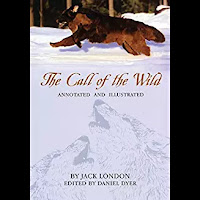So now we're reading that the new Trump budget is slashing spending for the National Endowment for the Arts, the National Endowment for the Humanities. There will not be much savings here--not much at all: The two combined are barely visible on a federal budget pie chart. A story today in the Chicago Tribune labels these cultural agencies (and two others under the gun) "negligible" in the overall federal budget. (Link to article.)
Rather than fling statistics around--rather than look at slices of pie charts--let me tell you a story.
In 1990 the National Endowment for the Humanities selected me to be one of a dozen secondary school teachers in the nation to attend a six-week summer seminar on Jack London out in Rohnert Park, California, not far from Glen Ellen, where London owned a ranch (now a park), the ranch where he died in 1916.
Leading our seminar was Prof. Earle C. Labor, one of the principal London scholars in the world. (His biography of London--based on a long life of scholarly ... labor--appeared in 2013. Jack London: An American Life is a wonderful book--detailed, accurate, accessible to general readers.) I was soon to discover, what a warm, engaging man Earle is. We were soon fast friends. And still are.
The NEH paid for me to drive out to California--provided a small living stipend--and, in its way, let me know that I was, well, important. I didn't know much about London at the time. I'd been teaching The Call of the Wild for a few years, had been reading London's other 49 books (!!), and was profoundly curious about this man and his work.
Day after day, I sat with Earle and with the other teachers (wonderful people), talking about what we'd read the night before. In the afternoons we would go on local trips (to the ranch and other relevant sites). And we each had a "project" to complete.
I settled on doing annotations for The Call of the Wild. Place-names, historical allusions to the Klondike Gold Rush, slang, names of characters--these are the sorts of things I began to research and annotate. It was a far larger project than I'd ever expected, and I knew I was going to be able to scratch only the surface of the topic. Earle understood this quite well. He was encouraging, and at the end of the summer he suggested I continue my work and publish my results in a new edition of Wild.
And so I did. For several years I chased down everything I could about that short novel, and in 1995 the University of Oklahoma Press published my The Call of the Wild, by Jack London: With an Illustrated Reader's Companion. It was full of old photographs, maps, charts. And many end notes and annotations.
Two years later the Press published a paperback version of the book--fewer photographs and notes--suitable for more general readers, classrooms, etc. They also published my brief teacher's guide to the novel.
So ... all the work I'd done that summer--funded by the NEH--was now "out there"--available for all those other readers and teachers and students who could use it. And I hoped there would be many.
But the NEH and I were not through with each other. During the 1992-93 academic year, they awarded me one of fifty Teacher-Scholar Awards (one going to one teacher in each state)--an award my wife, Joyce, had won a few years earlier (always the follower, I!), an award that enabled me to spend a year doing more of the research for the editions of Wild I was working on.
In the summer of 1993 I got a research grant from the NEH to read the plays written by Shakespeare's contemporaries--a project that enabled me to enrich my students' experiences with the Bard--and to inform my writing about Shakespeare.
These grants led to other things: In 1997, I published with Scholastic Press (who also published that series about that little fellow Harry Potter!) Jack London: A Biography, a YA book that won some awards. But the best thing--It re-introduced many more young readers to London's astonishing life--and his varied works (only four of his fifty books are about dogs!).
So ... the National Endowment for the Humanities had a profound influence on my life, my career. It cost them very, very little, but it stimulated me, encouraged me, supported me as I sought both to satisfy my curiosity and improve my abilities to engage kids about Jack London, about Shakespeare, about reading and literature.
(Oh, I've also published (2012) a Shakespeare bio for YA readers on Kindle Direct. Thank you again, NEH.)
So ... the recent news about the Trump budget is that the administration and Congress are hoping to cut--drastically--the abilities of the NEA and NEH to fund and encourage people like me. And Joyce.
In my view this has not a thing to do with saving money but has everything to do with a kind of petty vindictiveness against those whom Trumpies like to label "elites." People like me. A retired schoolteacher. A writer. Living on a sufficient but hardly enriching pension. Hoping his health insurance will remain in force until his unrelenting cancer inevitably wins.







No comments:
Post a Comment